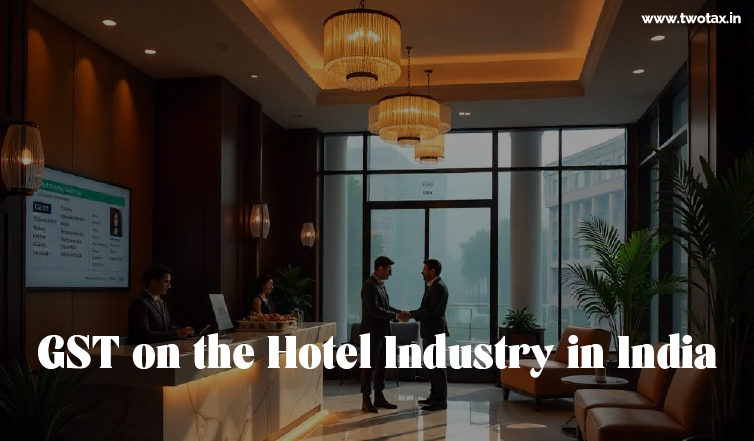Connect with us for all your queries



Imagine you’re planning a trip to Mumbai. You find two hotels—Sunrise Inn, a budget-friendly stay, and Royal Grandeur, a luxury five-star property. While both offer excellent hospitality, their taxation structures are vastly different due to the Goods and Services Tax (GST). Before GST, hotels had to navigate a complicated system of service tax, luxury tax, and VAT, with rates differing across states. With the introduction of GST, India’s hospitality sector witnessed a major transformation, streamlining taxation and improving transparency.
In this blog, we will dive deep into GST on the hotel industry in India, covering tax rates, compliance, benefits, challenges, and how businesses can optimize their tax strategies.
Hotels, lodges, guest houses, and inns come under the purview of GST based on their room tariffs. The GST regime has replaced multiple indirect taxes, ensuring a uniform structure across states. Any hotel with an annual turnover exceeding Rs. 20 lakh (Rs. 10 lakh in special category states) must register under GST.
| Room Tariff (Per Night) | GST Rate |
|---|---|
| Less than Rs. 1,000 | Exempt |
| Rs. 1,001 to Rs. 7,500 | 12% |
| Above Rs. 7,500 | 8% |
For example, if a guest books a Rs. 10,000 per night room at Royal Grandeur, the applicable GST is 18% (Rs. 1,800 per night). However, travelers at Sunrise Inn paying Rs. 900 per night enjoy a GST exemption.
Hotels serving food and beverages attract different GST rates based on service type:
| Type of Service | GST Rate |
|---|---|
| Restaurants (Non-AC, Non-Alcohol Serving) | 5% (No ITC) |
| Restaurants (AC, Alcohol Serving) | 18% (With ITC) |
| Room Service / In-Room Dining | Same as restaurant rates |
For example, a guest at Royal Grandeur ordering a meal worth Rs. 2,000 in an AC restaurant with alcohol will pay Rs. 360 as GST (18%).
Many hotels offer banquet halls for weddings, corporate events, and conferences. The applicable GST rate is 18% on venue rentals, while additional services like catering, decoration, and audio-visual equipment are taxed at their respective rates.
For instance, if a corporate client books a conference hall for Rs. 5 lakh, the GST will be Rs. 90,000 (18%).
Hotels can claim ITC on GST paid for furniture, equipment, maintenance, and supplies. However, restaurants opting for the 5% concessional tax rate are not eligible for ITC.
If Royal Grandeur purchases furniture worth Rs. 5 lakh and pays 18% GST (Rs. 90,000), it can claim this amount as ITC, reducing its tax liability.
However, if its in-house restaurant opts for the 5% GST rate, it cannot claim ITC on raw materials like vegetables and meat.
GST Registration: Mandatory for hotels with an annual turnover exceeding Rs. 20 lakh (Rs. 10 lakh in special category states).
GST Invoicing: Proper tax invoices must be issued for all transactions.
GST Return Filing: Regular filing of GSTR-1 (outward supplies), GSTR-3B (summary returns), and annual returns is required.
E-Way Bill Compliance: Required for goods transportation exceeding Rs. 50,000 in value.
Simplified Tax Structure: GST replaced multiple indirect taxes, reducing complexity.
Transparency & Uniformity: Standardized rates across states bring pricing clarity.
Boost to Tourism: Rationalized tax rates make accommodations more competitive.
ITC Benefits: Helps hotels lower operational costs by availing input tax credits.
Higher Tax Burden on Luxury Hotels: 18% GST on premium hotels increases costs.
No ITC for Restaurants Under 5% GST: Restaurants operating in hotels lose tax credit benefits.
Complex Compliance: Filing multiple GST returns and adhering to state-specific regulations add operational challenges.
Classify services correctly to apply the right GST rates.
Ensure proper invoicing to avoid compliance issues.
Claim ITC efficiently to reduce operational costs.
Consult tax professionals for error-free GST filing and compliance.
The hotel industry in India has greatly benefited from GST, with simplified taxation and standardized rates. However, higher tax rates on luxury hotels and ITC restrictions on restaurants pose challenges. To navigate these complexities, seeking expert guidance is essential.
For seamless GST compliance and tax optimization, partner with TwoTax—your trusted advisor in the hospitality sector. Contact us today to ensure your hotel business maximizes tax benefits while staying compliant with GST regulations.
Tax Partner is India’s most reliable online business service platform, dedicated to helping you in starting, growing, & flourishing your business with our wide array of expert services at a very affordable cost.